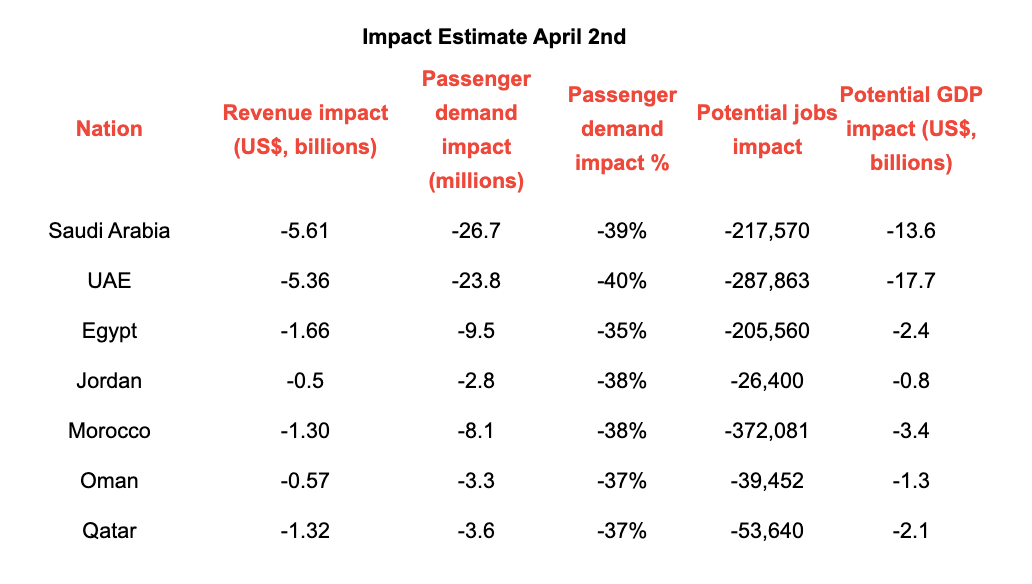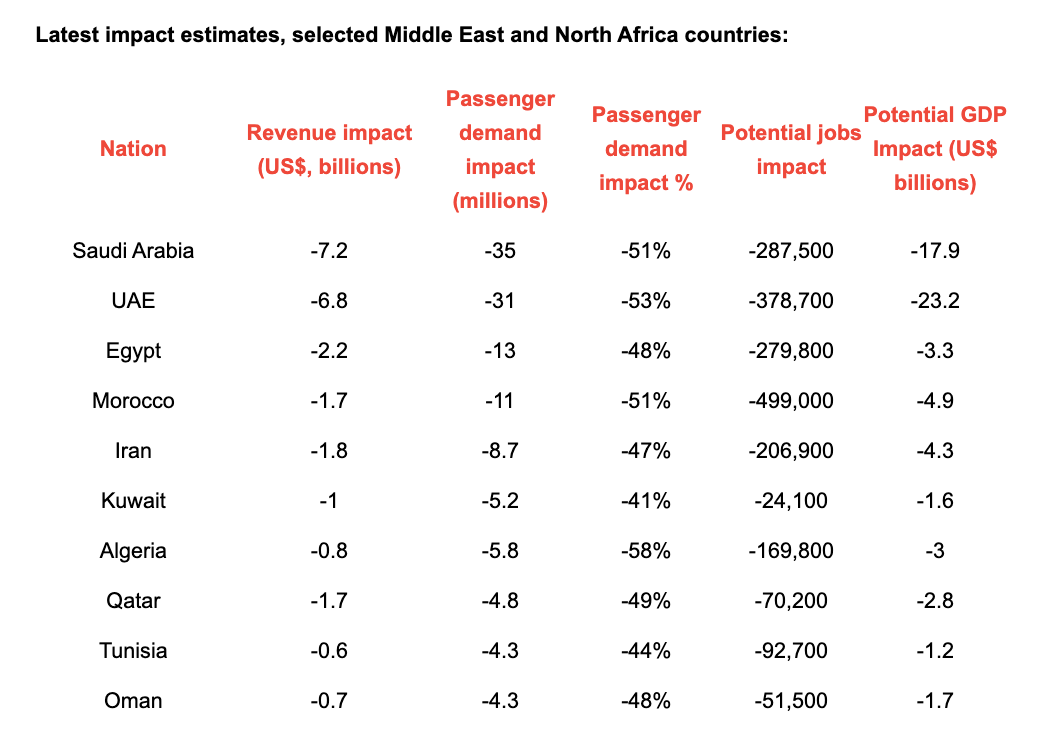Help needed in MENA region
The impacts of the COVID-19 crisis in MENA have become greater than expected; therefore the International Air Transport Association (IATA) has put out an urgent call for government relief.
Overall, estimates of passenger revenue loss and job losses are now at about 20% more than had previously been expected whereas full-year traffic and the GDP supported by aviation are expected to be less than half what they were last year, resulting in losses greater than 20% more than expected. These estimates are based on severe travel restrictions lasting for three months, with a gradual lifting of restrictions in domestic markets, followed by regional and intercontinental.
Passenger revenue loss is now expected to be US$24 billion compared to 2019, versus the $19 billion previously estimated. Job losses are now estimated at 1.2 million, or 50% of the region’s aviation-related employment force, up from 0.9 million. Traffic had been estimated to drop 39% for the full year whereas the revised figure is 51%, and aviation-supported GDP is expected to fall by US$66 billion from US$130 billion in 2019, revised at US$15 billion dollars more than had been determined.

“Airlines in the Middle East continue to be battered by the impact of COVID-19,” says Muhammad Al Bakri, IATA’s Regional Vice President for Africa and the Middle East. “Passenger traffic has all but ground to a halt and revenue streams have evaporated. No amount of cost cutting will save airlines from a liquidity crisis. The collapse of air transport will have devastating effects on countries’ economies and jobs. And in a region where aviation is a key pillar of many nations’ economies the effect will be much worse. Direct financial support is essential to maintain jobs and ensure airlines can remain viable businesses.”
National impacts:
Saudi Arabia: 35 million fewer passengers; US$7.2 billion revenue loss; 287,500 jobs lost; US$17.9 billion lost in contribution to the nation’s economy
UAE: 31 million fewer passengers; US$6.8 billion revenue loss; 378,700 jobs lost; US$23.2 billion lost in contribution to the nation’s economy
Egypt: 13 million fewer passengers; US$2.2 billion revenue loss; 279,800 jobs lost; US$3.3 billion lost in contribution to the nation’s economy
Morocco: 11 million fewer passengers; US$1.7 billion revenue loss; 499,000 jobs lost; US$4.9 billion lost in contribution to the nation’s economy
Iran: 8.7 million fewer passengers; US$1.8 billion revenue loss; 206,900 jobs lost; US$4.3 billion lost in contribution to the nation’s economy
Algeria: 5.8 million fewer passengers; US$0.8 billion revenue loss; 169,800 jobs lost; US$3.1 billion lost in contribution to the nation’s economy
Kuwait: 5.2 million fewer passengers; US$1billion revenue loss; 24,100 jobs lost; US$1.6 billion lost in contribution to the nation’s economy
Qatar: 4.8 million fewer passengers; US$1.7 billion revenue loss; 70,000 jobs lost; US$2.8 billion lost in contribution to the nation’s economy
Tunisia: 4.3 million fewer passengers; US$0.6 billion revenue loss; 92,700 jobs lost; US$1.2 billion lost in contribution to the nation’s economy
Oman: 4.3 million fewer passengers; US$0.7 billion revenue loss; 51,500 jobs lost; US$1.7 billion lost in contribution to the nation’s economy

The IATA is calling to governments for a combination of direct financial support; loans, loan guarantees and support for the corporate bond market; and tax relief to minimize the damage these losses would have across all economies in the Middle East.
Planning for the future
As the aviation industry must not only survive the current crisis but also plan ahead for a gradual reopening, the IATA is holding a series of virtual regional summits, bringing together governments and industry stakeholders, with two main objectives:
• Understanding what is needed to re-open closed borders, and
• Agreeing on solutions that can be operationalized and scaled efficiently
“As governments struggle to contain the COVID-19 pandemic, an economic catastrophe has unfolded,” says Al Bakri. “Restarting aviation and opening borders will be critical to the eventual economic recovery. Airlines are eager to get back to business when and in a way that it is safe. But starting up will be complicated. We need to make sure that the system is ready, have a clear vision of what is needed for a safe travel experience, establish passenger confidence and find ways to restore demand. Cooperation and harmonization across borders will be essential to restart aviation.”







.jpg?&resize.width=322&resize.height=483)


